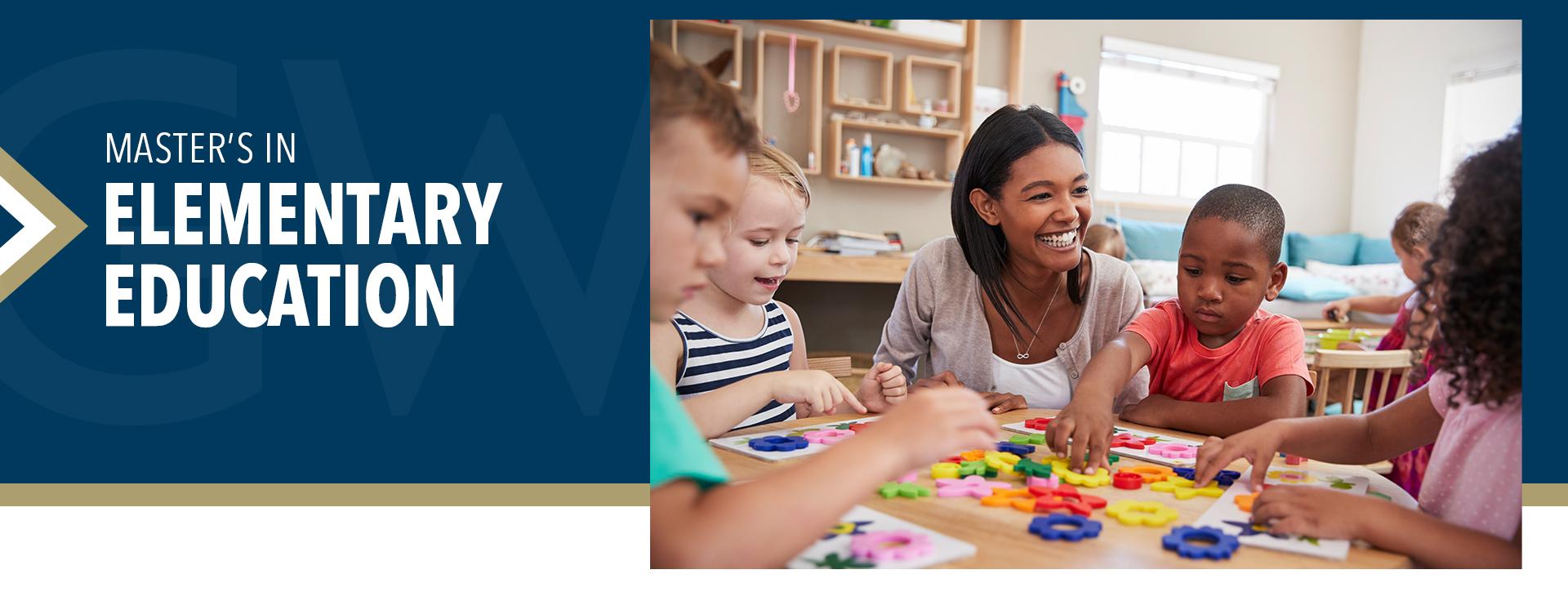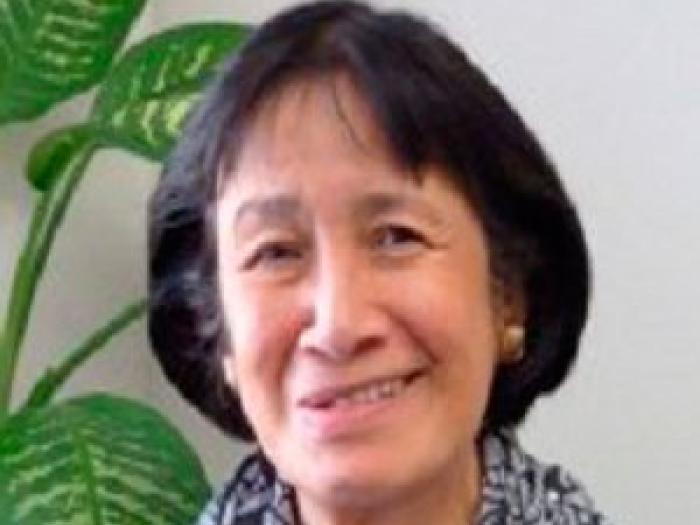Student Named 2025-2026 Beck Endowment Recipient


As teaching and learning practices constantly evolve to better cater to students' needs, our program provides an innovative experience to prepare you to adapt and to become an effective teacher and leader in your field.
The one- or two-year intensive master's program, accredited by CAEP, results in eligibility for licensure in teaching elementary school (grades 1-6).
The program's conceptual framework consists of an integrated set of three themes, detailed below, that are reflected in all aspects of program coursework and related clinical experiences.
Knowledge
Good teachers know the subject matter they teach; exceptional teachers understand the process of its construction and its impact in life. This extended comprehension establishes a base for meaningful classroom instruction to help students understand their own thought processes and how the lesson applies to their daily lives. Understanding these principles of knowledge allows teachers to help students effectively think, communicate and participate in the real world.
Individuality
Based on their rich array of experiential and cultural backgrounds, students bring a diverse set of personal, social, and academic expectations to the classroom. Effective teachers are attentive to students as individuals and are sensitive to the broader cultural context that gives shape to diversity. This awareness helps design meaningful programs of study that maximize the development of each student’s potential.
Social Responsibility
Teaching is a socially significant profession that requires a wider moral vision extending beyond the narrowness of personal gain and intellectual development. The education of today’s youth is connected to many crucial issues confronting the larger social order. Good teachers recognize, reflect, and actively explore these important connections that link school and society, classroom and community.
What better place to examine education history, reform, and methods than in the policymaking capital of our nation? Benefit from our unique location and connections to government agencies and leading educational organizations. Plus, you'll receive a wealth of hands-on experiential learning and career opportunities at nearby urban and suburban public, charter and private schools.
Master of Education (M.Ed.) in the Field of Elementary Education
(Licensure Eligible)
Curriculum and Pedagogy
Foggy Bottom Campus
Summer (Full-Time: 1-Year Cohort)
Fall (Part-Time: First Year Only, 2-Year Cohort)
The mission of the program, grounded in GSEHD's bridging concepts — Research and Scholarship, Reflective Practice, Community Service, and Educational Leadership, is to prepare teachers who are:
The following requirements must be fulfilled: 33 credits in required courses, successful completion of a master's comprehensive examination, and completion of the relevant teacher licensure assessments (see below).
| Code | Title |
|---|---|
| Required: | |
| Foundations | |
| CPED 6604 | Perspectives in American Education |
| CPED 6606 | Theories of Learning and Development |
| CPED 6608 | Development and Diversity |
| SPED 6290 | Affective Development and Behavior Management for Teaching Students with Disabilities |
Methodology | |
| CPED 6410 | Reading Children’s Literature across the Curriculum |
| CPED 6412 | Elementary School Curriculum and Methods (Math) |
| CPED 6412 | Elementary School Curriculum and Methods (Science) |
| CPED 6412 | Elementary School Curriculum and Methods (Language Arts) |
| CPED 6412 | Elementary School Curriculum and Methods (Social Studies) |
| CPED 6623 | Foundations of Reading Development |
| EDUC 6114 | Introduction to Quantitative Research |
Internship | |
| CPED 6635* | Professional Internship in Elementary Education (taken for 6 credits) |
Successful completion of comprehensive examination | |
| Completion of the relevant teacher licensure assessments (i.e., PRAXIS) required by the District of Columbia Educator Licensure Services Office | |
Download Program Plans for the 1- and 2-year options (2025-2027) >
Licensure Eligible: A one-year or two-year, intensive 33 credit program, the Elementary Education model leads to eligibility for licensure in grades 1-6. The program is accredited by the Council for Accreditation of Educator Preparation (CAEP) which includes state-approval under the District of Columbia -- Office of State Superintendent of Education (OSSE) a partnership state with CAEP.
Requirements:
Partnership Schools
Alexandria City
James Polk*
Samuel Tucker*
Arlington County
Arlington Science Focus School
Glebe
Long Branch
Tuckahoe
District of Columbia Public Schools
Eaton NW
Hyde-Addison NW
Janney NW
Key NW
Lafayette NW
Langley NE
Watkins SE
District of Columbia Public Charter Schools
DC Bilingual Public Charter NE
Washington Yu Ying Public Charter NE
Fairfax County
Great Falls
Spring Hill
Falls Church City
Oak Street
Montgomery County
Somerset*
Independent Schools
Concord Hill School (Montgomery County)
Georgetown Day School (DC)
Norwood School (Montgomery County)
Our Savior Lutheran School (Arlington County)
Washington International School (DC)
Applications are not currently being accepted for this program. For more information or to inquire about the next admissions cycle, contact the GSEHD Admissions Team at teachinfo![]() gwu [dot] edu (teachinfo[at]gwu[dot]edu) or 202-994-9283.
gwu [dot] edu (teachinfo[at]gwu[dot]edu) or 202-994-9283.
To be considered for admission, applicants must submit the online application form as well as the following required supporting documents. There is no application fee.
*Additional application requirements may exist for international applicants.
Applications are not currently being accepted for this program. For more information or to inquire about the next admissions cycle, contact the GSEHD Admissions Team at teachinfo![]() gwu [dot] edu (teachinfo[at]gwu[dot]edu) or 202-994-9283.
gwu [dot] edu (teachinfo[at]gwu[dot]edu) or 202-994-9283.
We know embarking upon graduate school is a big decision - due in part to the costs of attending. At GW, we understand the time and thought behind making graduate school work for you. Please take a moment to learn more about the options and opportunities available to help fund your graduate education.
Students have been offered an average of 25-50% tuition support upon committing to the Elementary Education program. In 2022, merit fellowships of 50% of the total program tuition were awarded to new students.
In addition to dedicated program awards, two endowments are available annually to Elementary Education students -- the Beck Endowment and the John Horrworth Children's Book Award. Learn more about these awards from past recipients >
Graduate tuition is charged per credit hour, unless otherwise noted. Rates vary by program and location.
The tuition rate* for the Master's in Elementary Education program is $1,960 per credit hour.
This program requires 33 credits.
Please note: Additional fees may apply for international students, late fees, etc. Current tuition rates may be updated during the year.
*Summer 2025, Fall 2025 and Spring 2026
Scholarships are available to eligible admitted students. Review eligibility requirements and learn more about funding your education >


My time in this program has offered me so many opportunities and experiences for which I will be forever grateful. Thank you to the program faculty for teaching me to be the best teacher I can be and for supporting me through this program and my teaching endeavors. I know that I would not be the teacher, or person, that I am today without this program, the amazing faculty, and my incredible classmates. The level of dedication and hard work that it takes to dive into this profession is daunting, and this program made it feel much more possible than I could have imagined. I cannot wait to begin my career as a teacher.
ELLA FLUDZINSKI
(M.Ed. '22, Elementary Education)
In the last 5 years, 100% of Elementary Education program participants have been employed following graduation. Our Elementary Education graduates are teaching throughout the Washington, DC metropolitan area and the country.

In addition to teachers, graduates of this program have become:

I have been in the Master's in Elementary Education for a year now, and I can genuinely say that I look forward to every class that I attend. The professors are engaging and want all students to succeed. I knew I wanted to enroll in GSEHD at GW because of the professors, smaller cohorts, and the internship program where graduate students can work at partner schools in the area.
VIRGINIA MEAD (Current Student)



Download the Fall 2024 Elementary Ed Newsletter >
